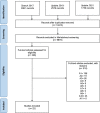Interprofessional collaboration and patient-reported outcomes in inpatient care: a systematic review
- PMID: 35964148
- PMCID: PMC9375378
- DOI: 10.1186/s13643-022-02027-x
Interprofessional collaboration and patient-reported outcomes in inpatient care: a systematic review
Abstract
Background: Interprofessional collaboration (IPC) is seen as the "gold standard" of comprehensive care, but credible evidence concerning the effects on patient-reported outcomes (PRO) is lacking. The aim of this systematic review is to study the effect of IPC on PRO in inpatient care.
Methods: We systematically searched six electronic databases (PubMed, Web of Science/Social Science Citation Index, CENTRAL (Cochrane Library), Current Contents (LIVIVO), CINAHL, and Embase) for studies published between 1997 and 2021. Additional studies were identified through citation tracking, manually searching the Internet and Google Scholar, and consultation of experts. Risk of bias (RoB) was assessed using the RoB 2 tool for randomized controlled trials (RCTs) and ROBINS-I for non-randomized studies (NRS). The included controlled before-and-after study (CBA) was assessed using both the ROBINS-I and the Effective Practice and Organization of Care (EPOC) quality criteria. Results were synthesized through narrative description, grouping, and thematic analysis of extracted data.
Results: The search yielded 10,213 records, from which 22 studies (16 RCTs, five NRS, and one CBA) fulfilled the inclusion criteria. In all but five studies, RoB was assessed as being high (RoB 2) resp. critical or serious (ROBINS-I). Within these 22 studies, nine inductively derived outcomes were assessed: (i) quality of life, (ii) coping, (iii) functional ability and health status, (iv) psychiatric morbidity, (v) pain, (vi) managing one's own health care, (vii) treatment success, (viii) satisfaction, and (ix) therapeutic relationship. While some studies do not report effect estimates, and some of the reported effects appear to be imprecisely estimated, the overall results indicate that IPC may affect PRO positively across all outcomes.
Conclusions: Due to high clinical heterogeneity and high RoB, the question whether IPC affects PRO cannot be answered conclusively. Methodically rigorous studies are needed in order to answer the question of effectiveness of IPC.
Systematic review registration: PROSPERO CRD42017073900.
Keywords: Collaboration; Inpatient; Interdisciplinary; Interprofessional; Patient-reported experiences; Patient-reported outcomes; Quality improvement; Quality of care.
© 2022. The Author(s).
Conflict of interest statement
The authors declare that they have no competing interests.
References
-
- Johnston BC, Patrick DL, Devji T, Maxwell LJ, Bingham III CO, Beaton D, Boers M, Briel M, Busse JW, Carrasco-Labra A, Christensen R, da Costa BR, El Dib R, Lyddiatt A, Ostelo RW, Shea B, Singh J, Terwee CB, Williamson PR, Gagnier JJ, Tugwell P, Guyatt GH. Chapter 18: Patient-reported outcomes. In: Higgins JPT, Thomas J, Chandler J, Cumpston M, Li T, Page MJ, Welch VA (editors). Cochrane Handbook for Systematic Reviews of Interventions version 6.1 (updated September 2020). Cochrane, 2020. 2020. www.training.cochrane.org/handbook.
Publication types
MeSH terms
LinkOut - more resources
Full Text Sources


